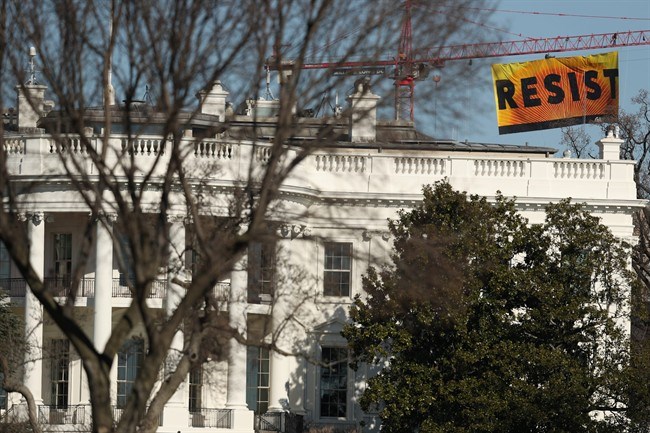 Kristi Miller can be forgiven for feeling a bit of déjà vu. Six years ago, the Vancouver Island fish researcher found herself the accidental poster child for the muzzling of Canadian government scientists.
Kristi Miller can be forgiven for feeling a bit of déjà vu. Six years ago, the Vancouver Island fish researcher found herself the accidental poster child for the muzzling of Canadian government scientists.
Now she’s hearing echoes of the past from the U.S., where the Trump administration has the scientific community shuddering.
This week, the White House slapped a media blackout on the Environmental Protection Agency and a few other arms of government where scientific fact might prove inconvenient to political policy. No issuing press releases. No social-media updates. No talking to journalists. Existing website content would be subject to political review and a “temporary hold” would prevent publication of new studies.
Sound familiar, Canada?
Back in 2011, there was an uproar when it was discovered that Miller, a molecular geneticist at the Department of Fisheries and Ocean’s Pacific Biological Station in Nanaimo, had been silenced for political purposes. She became Exhibit A as critics charged the Harper government with the Machiavellian manipulation and suppression of science to match its own agenda.
The fuss began that January when the prestigious journal Science published Miller’s groundbreaking research suggesting a virus was behind the collapse of Fraser River sockeye salmon stocks in 2009. When journalists came clamouring for interviews, they were blocked by DFO.
Miller said scientists were told that the department didn’t want them talking to the media before testifying to the Cohen Commission, a government-ordered inquiry into the collapse. OK, fair enough.
Only thing is, it didn’t stop there. Scientists found that all media requests for interviews were denied. Then the brass began balking at scientists speaking at events where journalists might be present. Then it was anywhere the audience included members of the public, not just scientists.
“It got worse and worse and worse,” she recalled this week. Scientists worried about catching hell for speaking about what they knew. “It was stressful.”
Eventually, Miller discovered that the order to stop her from speaking about her work came from the privy council, which serves the prime minister’s office. Those at the top didn’t like how her research was framed. “It wasn’t considered a ‘good news’ story,” she said. Miller didn’t connect the dots between the sockeye virus and B.C. fish farms, but the politicians feared others would attempt to make the link.
Her story was just one example of an information clampdown that permeated the federal government. Everything, even the most apolitical request for background information, had to be run through a political filter. One scientist needed clearance from political staff before discussing a report on flooding that occurred in northern Canada 13,000 years ago.
In 2014, a Canadian Press request to interview a Nanaimo scientist about his research into the algae known as “rock snot” resulted in 100 pages of emails by 16 government communications professionals, but no interview. An Ottawa Citizen request for data from a Canada-U.S. snowfall study led to at least 11 government staffers swapping dozens of emails before providing the newspaper with an unhelpful answer.
To reiterate, the scientists weren’t being asked for opinion, just basic background on their areas of expertise. That sort of info is supposed to be — and used to be — open to scrutiny. Politicians have the right to make political decisions in which, say, economic considerations trump scientific ones, but they don’t have the right to suppress awkward scientific information.
The reality, though, is that it’s a lot easier to push through a political agenda without having to explain away inconvenient facts. (“Media coverage of climate change science, our most high-profile issue, has been reduced by over 80 per cent,” said a 2010 internal document at Environment Canada, where scientists were barred from dealing with the media in 2007.)
Not being allowed to talk to journalists wasn’t a big deal for individual scientists, most of whom don’t seek media attention anyway, Miller noted. The real problem was that the public didn’t learn about the valuable work being done by scientists, which made it easier for the government to kill programs without a backlash. “In the end, it made it much easier to quietly cut programs,” Miller said.
It makes it much easier to, say, pave the way for industrial development by reducing risk assessments in the name of “streamlining.”
Anyway, there was a palpable sigh of relief when Justin Trudeau took the gag off scientists within days of being elected. It was a signature move, meant to contrast his government with Harper’s.
Except now we’re hearing those echoes from the south, where there is talk of a March for Science to protest Trump’s moves.
Does Miller have anything to say to colleagues in the U.S.?
“Yeah: Good luck,” she said. “Scientists are going to have to evaluate what they’re going to put up with in their jobs. I stuck it out — and I’m glad I did because I love what I do — but others didn’t.”



